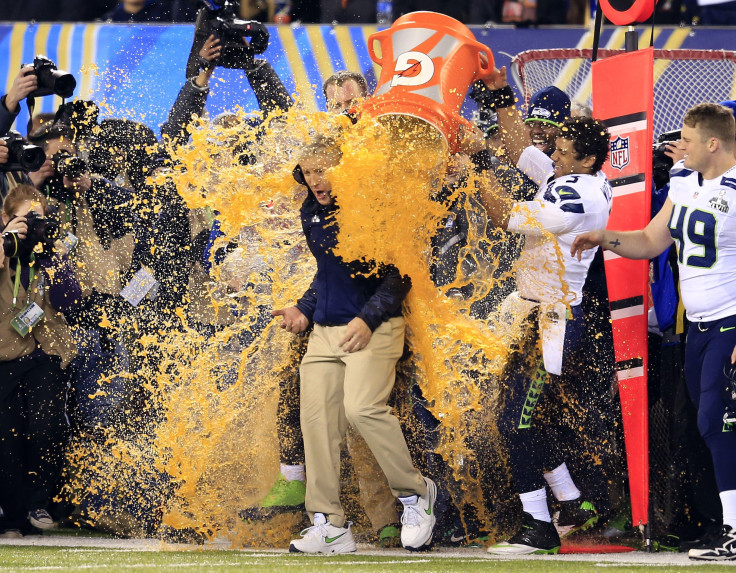Super Bowl 2016: Prop Betting Surges, Fueled By Fantasy Football — And Fantasies

If you’re watching the Super Bowl on Sunday, and you’re less interested in the game’s outcome than how long it takes Lady Gaga to sing the national anthem, or what color Gatorade will be dumped on the winning coach, or whether there will be an earthquake, then it’s very possible that you have a gambling problem. But you’re also in good company: You're one of millions of Americans interested in the growing world of Super Bowl prop bets.
Prop bets, short for proposition bets, are a kind of sports wager that have grown from a curiosity into an enormous source of income for sportsbooks, with action on Super Bowl props recently starting to overtake action on the game's outcome. Last year, more than 40 percent of the bets taken by the sportsbook at the MGM Grand in Las Vegas were on prop bets; the casino declined to discuss specific dollar amounts. Nick Bogdanovich, the director of trading at a separate sportsbook, William Hill US, expects that at least 60 percent of the Super Bowl bets his book will take for this Sunday will be on props.
“The popularity of prop wagering is through the roof,” said Michael Grodsky, William Hill US’s director of marketing. William Hill US alone offers 834 different bets on things that might or might not happen in the game, including who will be named most valuable player, whether or not a safety will occur, and which player is going to score the first points of the game.
And while 800 possible wagers might sound excessive, Grodsky said it’s merely William Hill meeting the needs of the market. “Almost every single prop gets action,” Grodsky said. “Every time we put more and more on the menu, it's because we're responding to demand.”
Prop bets are nothing new. Back in the 1980s, William Hill, which started out in the U.K., was taking bets on who shot J.R. Ewing on the popular CBS show “Dallas.” Hunter S. Thompson wrote about gambling on the outcome of every single play of Raiders games he watched with John Walsh and Jann Wenner in the 1970s.
But props remained a minor part of Super Bowl betting until 20 years ago, when Kirk Brooks, the sportsbook director at the Boardwalk Casino, decided to create a bet that might draw some attention to his little-known casino in the runup to Super Bowl XXX. Brooks offered bettors the chance to wager on whether Michael Jordan, who was playing in a game on Super Bowl Sunday against the Phoenix Suns, would score more points than the Dallas Cowboys.
That bet was so unusual that it drew national headlines (albeit for a bigger sportsbook, which stole the idea), and it started a tradition of sportsbooks coming up with progressively more esoteric, unusual bets associated with the big game. Two years ago, you could bet on what color gloves the singer Renee Fleming would wear while she sang “The Star-Spangled Banner.” This year, you can bet on whether or not there will be an earthquake at Levi’s Stadium during the game.
Most props sound like silly ways for someone to part with his or her money. But they also attract so much attention the bookmakers have to be careful about what they offer, and at what odds. “It's not just a publicity stunt,” said Jon Campbell, a sports analyst at Odds Shark. “It started out that way, but now they've got to make sure those lines are right.”

So why, and how, did a buffet of odd bets become the main source of action on one of the biggest gambling days of the year? There's no one clear answer, but the rise of America’s greatest gambling substitute playing a role. “As Fantasy Football became more popular and as the stats surrounding it became more well known, prop betting became more mainstream,” Jay Rood, the vice president of race and sports at the MGM Grand, wrote in an email.
“Fantasy sports have really individualized sports and the way people follow them,” Campbell added. “Sometimes they know players better than they know teams, and when they get to Vegas, that's what they're most familiar with.”
The other answer is that the silly nature of the bets appeals to people who don't gamble regularly. "The casual bettor loves to bet a little and win a lot," Grodsky said. "They love Super Bowl props because they love long shots."
In other words, it might not be a great idea to bet heavily on whether or not there will be a safety in Sunday's game. But most people can't resist the temptation.
© Copyright IBTimes 2024. All rights reserved.





















